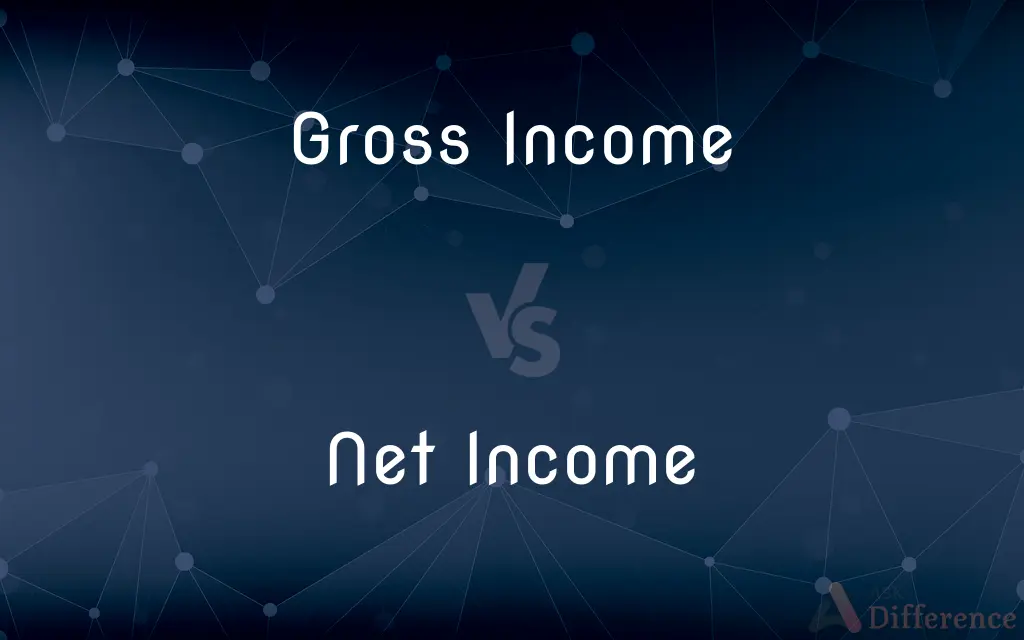Gross Income vs. Net Income — What's the Difference?
By Tayyaba Rehman — Published on October 16, 2023
Gross Income is total earnings before deductions; Net Income is what remains after all expenses and deductions.

Difference Between Gross Income and Net Income
Table of Contents
ADVERTISEMENT
Key Differences
Gross Income represents the total amount of money made before any expenses, taxes, or deductions come into play. It's a comprehensive view of an entity's revenue. Net Income, on the other hand, takes into account all those expenses, taxes, and deductions, giving a clear picture of the actual profit or loss.
When evaluating the financial health of a company or individual, Gross Income provides insight into the total revenue potential. It paints a picture of the top line, showing the full earning potential. Conversely, Net Income is indicative of the bottom line, highlighting the actual money made after covering all costs.
It's crucial to understand that while Gross Income can seem impressive, it does not always translate to profitability. That's where Net Income comes in, shedding light on how efficient a company or individual is in managing expenses against revenue. High Gross Income with low Net Income could indicate high costs or inefficient operations.
For individual taxpayers, Gross Income might include salaries, bonuses, and any other forms of income. After deducting allowable expenses and tax obligations, what remains is the Net Income. For businesses, Gross Income is often derived from sales minus the cost of goods sold, whereas Net Income takes into account operational costs, taxes, interest, and other financial obligations.
Gross Income and Net Income are pivotal metrics in finance. While Gross Income reflects potential, Net Income underscores efficiency and actual profitability, both of which are vital for stakeholders, investors, and decision-makers to assess financial health.
ADVERTISEMENT
Comparison Chart
Definition
Total earnings before deductions
Earnings after all expenses
Factors considered
Revenues or sales
Expenses, taxes, interest, etc.
Represents
Top line revenue
Bottom line profitability
Indicative of
Revenue potential
Efficiency and profitability
Importance in financial statements
Shows earning potential
Shows actual financial performance
Compare with Definitions
Gross Income
Gross Income can include salaries, bonuses, or sales.
Including his bonus, John's Gross Income for the year was quite impressive.
Net Income
Net Income is the profit after all expenses and taxes.
After deducting operating costs, the company's Net Income was $10,000.
Gross Income
Gross Income provides a top-line financial view.
Investors were initially attracted to the high Gross Income figures presented.
Net Income
Net Income provides a bottom-line financial perspective.
Stakeholders were primarily concerned about the dwindling Net Income figures.
Gross Income
Gross Income is the total revenue before any expenses.
Her Gross Income from the store sales was $50,000 last month.
Net Income
Net Income considers all financial obligations.
The Net Income was significantly lower this year because of unexpected tax liabilities.
Gross Income
Gross Income indicates an entity's comprehensive revenue.
The company's Gross Income skyrocketed due to the successful product launch.
Net Income
Net Income indicates actual profitability.
Despite high sales, the company's Net Income was disappointing due to excessive costs.
Gross Income
Gross Income doesn't consider taxes or other deductions.
While the Gross Income was high, significant expenses were yet to be accounted for.
Net Income
Net Income underscores financial efficiency.
The increased Net Income showed the company's improved operational efficiency.
Common Curiosities
Can a company have a high Gross Income but a low Net Income?
Yes, if a company has high expenses, its Gross Income can be high with a low Net Income.
What does Gross Income represent?
Gross Income represents total earnings before any deductions or expenses.
Can an individual's Gross Income and Net Income be the same?
If there are no deductions or expenses, an individual's Gross Income and Net Income can be the same.
How is Net Income different from Gross Income?
Net Income is the amount left after deducting all expenses from Gross Income.
Why might a company focus on improving its Gross Income?
Enhancing Gross Income can boost overall revenue potential and top-line growth.
What expenses are subtracted to get Net Income from Gross Income?
Operational costs, taxes, interest, and other financial obligations are subtracted.
Which is higher, Gross Income or Net Income?
Gross Income is always higher or equal to Net Income, as it doesn't account for deductions.
What does a declining Net Income suggest?
A declining Net Income may suggest increasing expenses, reduced revenues, or both.
Can Gross Income be negative?
Typically, Gross Income is positive, but in specific contexts like returns or allowances, it might appear negative.
Can operational efficiencies impact Net Income?
Yes, improving operational efficiencies can boost Net Income by reducing costs.
How does cost of goods sold relate to Gross Income?
Gross Income is often calculated by subtracting the cost of goods sold from total sales.
Why is Net Income crucial for investors?
Net Income indicates actual profitability and financial health of an entity.
What role does Net Income play in dividend distribution?
Net Income influences the profits available for dividend distribution to shareholders.
How frequently are Gross Income and Net Income calculated?
Often calculated quarterly and annually, but can vary based on business needs.
Which is more indicative of financial efficiency, Gross Income or Net Income?
Net Income is more indicative of financial efficiency as it considers all costs.
Share Your Discovery

Previous Comparison
Tap Water vs. Distilled Water
Next Comparison
Gorilla Glass vs. Panda GlassAuthor Spotlight
Written by
Tayyaba RehmanTayyaba Rehman is a distinguished writer, currently serving as a primary contributor to askdifference.com. As a researcher in semantics and etymology, Tayyaba's passion for the complexity of languages and their distinctions has found a perfect home on the platform. Tayyaba delves into the intricacies of language, distinguishing between commonly confused words and phrases, thereby providing clarity for readers worldwide.












































